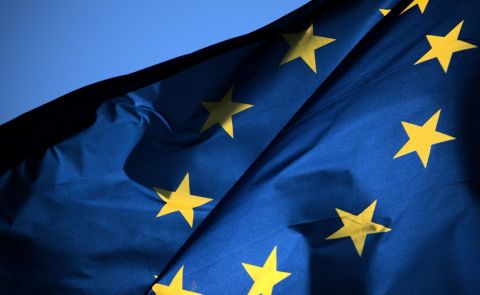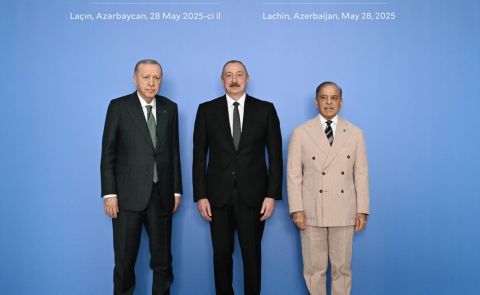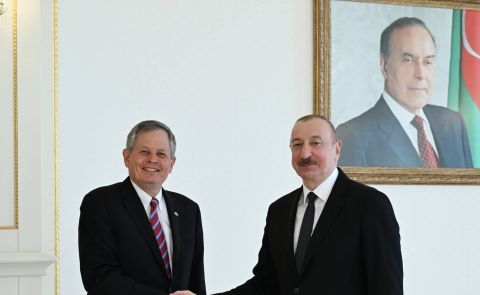
U.S. Administration Increases Criticism of Georgia, Signaling a Major Shift in Foreign Policy

On May 14, U.S. Assistant Secretary of State for European and Eurasian Affairs James O'Brien held a briefing to discuss the results of his visit to Georgia and his meetings with government, civil society and opposition representatives. The Assistant Secretary addressed the Foreign Agents Law, which was passed by Parliament in its final reading earlier in the day, highlighting the potential for its amendment and emphasizing the consequences if it is enacted in its current form.
Assistant Secretary O'Brien reiterated that the U.S. "deeply values our relationship with Georgia" and considers it a strategic partnership. However, he expressed concern that "frankly, some of the recent speeches here [in Georgia] and the actions of the Parliament made us wonder if our strategic interests are shared by the government."
He cited the more than $6 billion in U.S. assistance to Georgia since 1992 as a testament to the strategic partnership. He noted that this relationship has strengthened since Georgia decided to integrate into European and Euro-Atlantic structures, a commitment enshrined in the Constitution by the Georgian Dream (GD) government. The U.S., O'Brien said, is proud to have supported Georgia in this endeavor.
O'Brien shared his discomfort upon arriving in Georgia and encountering "two very different conversations. One conversation revolves around the "foreign influence law," with some advocates asserting that funding transparency must be Georgia's top national interest and criticizing Western funders for perceived transparency shortcomings. The Assistant Secretary, however, emphasized that the U.S. interest is in Georgia's alignment with EU and transatlantic norms for addressing transparency issues. He stressed that the law, both in its process and in its implementation, does not meet these standards. Although Georgian authorities promised opportunities to address these shortcomings before the law is implemented, O'Brien warned that "there would be consequences if the law is implemented as it now stands."
Prime Minister Kobakhidze characterized this as coercion, but O'Brien countered that Georgia's attempt to join the EU and NATO involves adhering to certain standards. He warned that to deviate from these standards would be to reject the path enshrined in Georgia's Constitution, a path favored by the majority of Georgians. If the law is modified to conform to these standards, O'Brien said, it would "strengthen our partnership rather than tear it apart, which is what I think is happening now.
O'Brien also addressed the GD's "global war party" rhetoric and the unfounded notion of a "Western conspiracy to remove the GD from office." He dismissed this as "unreal, wrong, and a complete misunderstanding of the international community's relationship with Georgia." He cited the refusal of GD honorary chairman Bidzina Ivanishvili to meet with him under the pretext of being under "de facto sanctions" as a prime example of this misunderstanding. O'Brien clarified, "There are no sanctions against him at this point. For such an influential individual to be so badly misinformed is shocking and disappointing."
He criticized the Prime Minister's justification for not facilitating a meeting with Ivanishvili as putting individual interests ahead of the country's constitutional commitment to international partnerships and EU and NATO integration. This incident, O'Brien suggested, could be a turning point in what has been a constructive partnership.
The Assistant Secretary outlined the U.S. position on demonstrations, advocating peaceful protests and police presence, and condemning intimidation of demonstrators. He warned that the relationship with the U.S. would be "at risk" if the law is enacted without complying with EU norms and if anti-U.S. rhetoric continues. The $390 million aid package, which includes defense, economic and development projects, would be "put under review".
O'Brien also warned that non-compliance with EU norms, undermining of democracy, and violence against peaceful demonstrators could result in U.S. financial and travel restrictions on individuals responsible for these actions and their families. He expressed hope that Georgia would resume its path toward the EU and NATO and as a robust democracy, otherwise "we will be revisiting these issues very soon," he concluded.
Siehe auch


Aserbaidschan, die Türkei und Pakistan betonen auf dem Gipfeltreffen in Lachin ihre wachsende strategische Zusammenarbeit

Ilham Alijew trifft US-Senator Steve Daines zur Erörterung der Stärkung der Beziehungen zwischen Aserbaidschan und den USA

Dmitry Volvach Reports 60% Growth in Azerbaijan-EAEU Trade Over Three Years

Ungarn besteht auf gleicher EU-Finanzierung für Armenien und Aserbaidschan

